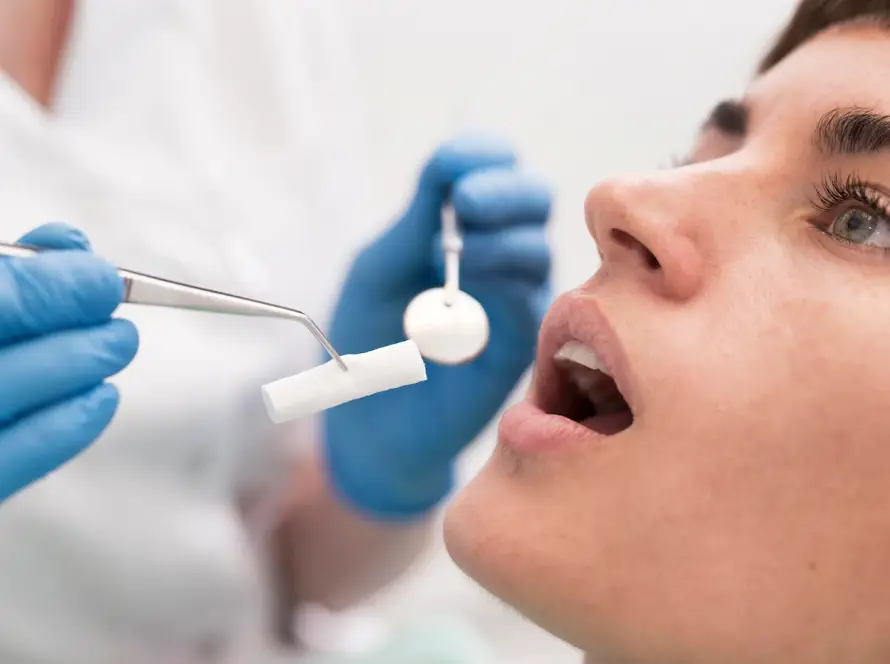Invisalign is a popular orthodontic treatment option that offers an alternative to traditional metal braces. It utilizes a series of clear, removable aligners that gradually shift the teeth into the desired position. This innovative treatment has gained attention for its discreet appearance and convenience.
Unlike traditional braces, Invisalign aligners are made of smooth, comfortable plastic, making them more comfortable to wear. Moreover, they are virtually invisible, allowing individuals to straighten their teeth without feeling self conscious about their appearance.
Invisalign treatment begins with a consultation with an orthodontist, who will assess the patient’s dental condition and determine if Invisalign is a suitable option. If deemed appropriate, a customized treatment plan will be developed, which includes a series of aligners that will need to be changed approximately every two weeks.
One of the key advantages of Invisalign is its convenience. The aligners can be easily removed for eating, brushing, and flossing, which means there are no dietary restrictions or extra steps required for oral hygiene. However, it is important to wear the aligners for the recommended 20 to 22 hours per day to ensure optimal results.
Invisalign treatment typically takes about 12 to 18 months, depending on the complexity of the case. Regular check ups with the orthodontist are necessary to monitor progress and make any necessary adjustments to the treatment plan.
While Invisalign is a popular choice for many patients seeking orthodontic treatment, it is essential to note that its effectiveness may vary depending on the individual’s specific dental needs. It is always recommended to consult with a qualified orthodontist to determine if Invisalign is the right option for one’s particular case.
Overall, Invisalign offers a modern alternative to traditional braces, providing individuals with a more comfortable and discreet option for achieving a straighter smile. However, it is crucial to follow the orthodontist’s instructions and maintain proper oral hygiene throughout the treatment process for the best possible outcome.
Can Invisalign Ruin Your Teeth?
Invisalign is a popular orthodontic treatment that uses clear aligner trays to straighten teeth. While it is generally considered safe and effective, there are some concerns about the potential for Invisalign to negatively impact dental health. However, it is important to note that when used properly and under the guidance of a qualified orthodontist, the risk of Invisalign ruining your teeth is minimal.
- Tooth decay: One of the main concerns with Invisalign is the increased risk of tooth decay. Since the aligner trays are worn for the majority of the day, they can create a moist environment that promotes the growth of bacteria. This can lead to an increased risk of cavities if oral hygiene is not maintained. However, regular brushing and flossing, as well as cleaning the aligners properly, can help minimize this risk.
- Gum inflammation: Another potential issue is gum inflammation or gingivitis. Improper placement or poor fitting of the aligner trays can cause friction or pressure on the gums, leading to irritation and inflammation. It is crucial to ensure that the trays fit correctly and to report any discomfort to the orthodontist to address this issue promptly.
- Root resorption: Some individuals worry about the possibility of root resorption, where the roots of the teeth shorten or even disappear during orthodontic treatment. While this is a potential risk with any type of orthodontic treatment, including Invisalign, it is generally rare and more likely to occur when excessive force is applied. With proper planning and monitoring, the risk of significant root resorption during Invisalign treatment is generally low.
- Enamel damage: In rare cases, improper technique or excessive force during the fitting process or tray placement can lead to enamel damage. However, it is important to remember that Invisalign treatment is typically conducted under the supervision of trained professionals who take precautions to minimize any potential harm to the teeth.
In conclusion, while there are potential risks associated with Invisalign, when used correctly and overseen by an experienced orthodontist, the chance of it ruining your teeth is minimal. Proper oral hygiene practices, regular monitoring, and communication with your orthodontist are crucial for ensuring a successful and safe Invisalign treatment.
What is Invisalign Treatment?
Invisalign treatment is a modern alternative to traditional braces for straightening teeth. It involves using a series of clear aligner trays that are custom made to fit over the teeth. These aligners gradually shift the teeth into their desired position, providing a more aligned and aesthetically pleasing smile.
The Invisalign process starts with a consultation with a qualified orthodontist who will assess the patient’s teeth and discuss their treatment goals. A digital scan or impression of the teeth will be taken to create a 3D model, allowing the orthodontist to plan the necessary tooth movements.
Once the treatment plan is established, the patient will receive their first set of aligners. Each pair of aligners is typically worn for about two weeks before progressing to the next set. Over time, the aligners gently and gradually shift the teeth into place, ensuring a comfortable and controlled movement.
One of the main advantages of Invisalign is its inconspicuous nature. Unlike traditional braces, the aligner trays are virtually invisible, making them a popular choice for individuals who desire a more discreet orthodontic treatment. Additionally, Invisalign aligners are removable, allowing for easier oral hygiene routines and the ability to enjoy a wider range of foods without restrictions.
Regular check up appointments will be scheduled throughout the treatment process to monitor progress and make any necessary adjustments. The total duration of Invisalign treatment can vary depending on the complexity of the case, but on average, it lasts between 12 to 18 months.
In conclusion, Invisalign treatment offers a convenient and effective way to straighten teeth without the inconvenience of traditional braces. Its custom made aligners, comfort, and virtually invisible appearance make it a popular choice among patients seeking a more discreet orthodontic solution.
What Types of Dental Issues Can Invisalign Correct?
Invisalign is a versatile orthodontic treatment that can effectively address a wide range of dental issues. Here are some common dental problems that Invisalign can correct:
- Crowding: Invisalign can help alleviate crowding, which occurs when there is insufficient space in the jaw for the teeth to align properly. By gradually shifting the teeth into their optimal positions, Invisalign can create a more balanced and aesthetically pleasing smile.
- Spacing: If you have gaps or spaces between your teeth, Invisalign can help close them. By repositioning the teeth and aligning them properly, Invisalign can improve both the function and appearance of your smile.
- Overbite: An overbite occurs when the upper front teeth excessively overlap the lower front teeth. Invisalign can correct this issue by gradually moving the upper teeth back and the lower teeth forward, achieving a more harmonious bite.
- Underbite: The opposite of an overbite, an underbite occurs when the lower teeth protrude further than the upper teeth. Invisalign can address this problem by gradually moving the lower teeth back and the upper teeth forward, improving both the bite and facial aesthetics.
- Crossbite: Invisalign can effectively treat a crossbite, which occurs when some of the upper teeth sit inside the lower teeth when biting down. By repositioning the misaligned teeth, Invisalign can achieve a healthier and more balanced bite.
- Open bite: An open bite is characterized by a gap between the upper and lower front teeth when the back teeth are together. Invisalign can correct this issue by gently moving the teeth into proper alignment, closing the gap and improving both the bite and smile aesthetics.
It’s important to note that Invisalign is an adaptable treatment option that can be customized to address each individual’s unique dental concerns. Nevertheless, it is crucial to consult with an experienced Invisalign provider to determine if this treatment is suitable for your specific case.
Can I Get Invisalign if I Grind My Teeth?
If you grind your teeth and are considering getting Invisalign, it is important to discuss this issue with your orthodontist. While Invisalign braces can be an effective solution for straightening teeth, teeth grinding can potentially impact the treatment process and overall results.
Teeth grinding, also known as bruxism, can put excessive pressure on the teeth and affect their alignment. This constant grinding motion can cause the teeth to shift and become misaligned over time. It can also lead to wear and tear on the teeth, gum problems, and jaw pain.
Invisalign aligners are designed to be worn for around 22 hours a day and should be removed during meals and when brushing your teeth. However, if you have a habit of grinding your teeth, this can pose challenges with the treatment process. The aligners may be more prone to damage, and the constant grinding motion can disrupt the aligner’s ability to properly move the teeth into their desired positions.
Your orthodontist will evaluate your specific case and determine whether Invisalign is a suitable option for you. They may recommend additional treatments, such as a nightguard or a different orthodontic treatment, to address the teeth grinding issue before starting Invisalign. By addressing the grinding habit, it ensures that the aligners can work effectively without being compromised by constant grinding forces.
It is crucial to have an open and honest conversation with your orthodontist about teeth grinding. They will be able to provide you with the best advice and guide you towards the most appropriate treatment plan for your specific needs. Communication is key to ensuring the success of your orthodontic treatment and the long term health of your teeth.
Is Invisalign right for you?
If you are considering orthodontic treatment, you may be wondering if Invisalign is the right option for you. Invisalign is a popular alternative to traditional braces, offering a more discreet and comfortable way to achieve straighter teeth. Here are a few key factors to consider when deciding if Invisalign is right for you:
- Alignment issues: Invisalign is suitable for correcting a range of alignment issues, including crowded teeth, gaps, overbites, underbites, and crossbites. However, severe cases may require traditional braces or other orthodontic interventions.
- Dedication to treatment: Invisalign aligners need to be worn for 20 to 22 hours a day to be effective. If you have difficulty committing to wearing the aligners consistently, then Invisalign may not be the best choice for you.
- Oral hygiene: Maintaining good oral hygiene is crucial during Invisalign treatment. The aligners should be removed when eating or drinking anything other than water, and meticulous brushing and flossing should be followed before reinserting them. If you struggle with maintaining good oral hygiene practices, this may affect the success of your Invisalign treatment.
- Lifestyle considerations: Invisalign aligners are removable, which can be a significant advantage for those who participate in contact sports or play musical instruments. However, if you tend to misplace or forget to wear items like retainers or aligners, this may impact the effectiveness of Invisalign for you.
- Cost: Invisalign treatment may be more expensive than traditional braces, depending on the complexity of your orthodontic issues and the duration of treatment. It is important to consider your budget and explore payment options or dental insurance coverage.
Before making a decision, it is always best to consult with an orthodontist who can evaluate your specific dental needs and recommend the most suitable treatment option for you. They can provide a comprehensive assessment and answer any questions you may have about Invisalign or alternative treatments. You can ask your questions to our expert team. Contact us.















